- Home
- Lisa Appignanesi
All About Love: Anatomy of an Unruly Emotion
All About Love: Anatomy of an Unruly Emotion Read online
Lisa Appignanesi was born in Poland and grew up in France and Canada. She is former Deputy Director of the Institute of Contemporary Arts in London, was President of English PEN and is Chair of the Freud Museum. She is General Editor of Profile Books’ Big Ideas series.
A prize-winning novelist and writer, she co-authored Freud’s Women and has written many bestselling novels. Her family memoir, Losing the Dead received critical acclaim and her book on the history of the Mind Doctors from 1800 to the present day, Mad, Bad and Sad, was shortlisted for four prizes, won the Medical Journalists’ Association Open Medical Book Award and the 2009 British Medical Association Award for the Public Understanding of Science.
She has been made a Chevalier de l’Ordre des Arts et des Lettres in recognition of her contribution to literature. Lisa Appignanesi lives in London.
Also by Lisa Appignanesi
Mad, Bad and Sad: A History of Women and the Mind Doctors from 1800 to the Present
Free Expression is No Offence (ed)
Freud’s Women (with John Forrester)
Losing the Dead
Simone de Beauvoir
The Cabaret
Femininity and the Creative Imagination: Proust, James and Musil
FICTION
The Memory Man
Kicking Fifty
Unholy Loves
Paris Requiem
Sanctuary
The Dead of Winter
The Things We Do for Love
A Good Woman
Dreams of Innocence
Memory and Desire
EDITED VOLUMES
The Rushdie File (with Sarah Maitland)
Dismantling Truth (with Hilary Lawson)
Science and Beyond (with Stephen Rose)
Ideas from France: The Legacy of French Theory
Postmodernism
All About Love
Anatomy of an Unruly Emotion
Lisa Appignanesi
W. W. Norton & Company
New York • London
Copyright © 2011 by Lisa Appignanesi
Copyright acknowledgments on page 403 constitute
an extension of this copyright page.
All rights reserved
For information about permission to reproduce selections from this book,
write to Permissions, W. W. Norton & Company, Inc.,
500 Fifth Avenue, New York, NY 10110
Production manager: Anna Oler
Library of Congress Cataloging-in-Publication Data
Appignanesi, Lisa.
All about love: anatomy of an unruly emotion /
Lisa Appignanesi. — 1st American ed.
p. cm.
Includes bibliographical references and index.
ISBN: 978-0-393-06945-7
1. Love. 2. Marriage. I. Title.
BF575.L8A67 2011
152.'41—dc22
2011006756
W. W. Norton & Company, Inc.
500 Fifth Avenue, New York, N.Y. 10110
www.wwnorton.com
W. W. Norton & Company Ltd.
Castle House, 75/76 Wells Street, London W1T 3QT
To my loved ones and those they love
Contents
Acknowledgements
PART ONE: OVERTURE THE RIDDLE OF LOVE
PART TWO: CONFIGURATIONS OF PASSION FIRST LOVE, YOUNG LOVE
Falling…
Coup de Foudre
In Love Again…
Twin Souls
That Romantic Feeling
Crazy about You
The Lure of the Forbidden
The New Religion
The Question of Sex
Excess and Its Discontents
Finding Mr Right
Inventing Love
PART THREE: LOVE AND MARRIAGE
From Antiquity to the Reformation
The Companionate Marriage
France: From Old Regimes to New
Victorian Marriage
Republican Marriage
Decline of an Institution
Unconventional Arrangements
Post-War
The Mid-twentieth-century Marriage
Unmaking Marriage
Today’s Unsettled Unions
Happily Ever After
Trouble in Paradise
Reinventions
PART FOUR: LOVE IN TRIANGLES
Adulterous Passions
The Way of All Marriage
The Green-eyed Monster
Contemporary Infidelities
Looking In
PART FIVE: LOVE IN FAMILIES
Babies
Mother-love
Expert Knowledge
The Child in History
Unconditional Love
Erotic Intruders
Father-love
Love’s Crucible
Siblings
Grandparents
Changing Families
PART SIX: LOVE AND FRIENDSHIP
The Most Fully Human of All Loves
Female Friends
Shaping Friendships
For Better or for Worse
Coda: The Love You Make
Notes
Select Bibliography
Index
Copyright Acknowledgements
Acknowledgements
Over the years I have learned so much from so many on the subject of love that my acknowledgements could extend for the length of this book. I owe a debt to all the novelists, thinkers, commentators and individuals who appear in its pages, as well as to my family and friends. Many, in the course of its writing, have put up with indiscreet probing as well as with long conversations, or consented to more formal interviews. To name even some of them is not enough, but it is the best I can do here. So my thanks for all their help, their ideas, their encouragement extend to Devorah Baum, John Berger, David Borenstein, Judit Carrera, Marie-Noelle Craissati, Maria Duggan, Eva Hoffman, Derek Johns, Helena Kennedy, Hari Kunzru, Hanif Kureishi, Darian Leader, Suzette and Helder Macedo, Giovanni Menegalle, Maxine Molyneux, Jasmine Montgomery, Susie Orbach, Lianna Schwartz-Orbach, Renata Salecl, Gillian Slovo, Martha Spurrier, Deborah Thom, Marina Warner and Lisa Wood.
I owe special thanks to Adam Phillips for his ever stimulating thoughts and conversation. My children, Josh Appignanesi and Katrina Forrester, have been particularly scintillating informants on the ways and waverings of their generation: their subtlety and provocation are a constant inspiration. Since we are all in our own way experts on love, none of the above will necessarily agree with what I have made of my subject.
I am grateful to Monica Holmes, an early and sagacious reader, and to Jamie Martin who helped patiently with the details of footnotes and bibliography.
Lennie Goodings, as ever, proved an ideal editor, encouraging and perceptive. My great thanks go to her and to Clare Alexander, my talented agent, as well as to Angela von der Lippe, my New York editor, whose acuteness and discernment are a constant boon. I am also grateful to Elise Dillsworth at Virago and my copy-editor Sue Phillpott.
And finally, my partner John Forrester put up with my moans and groans about love over the course of the book’s making. He has been both a stalwart companion and a meticulous reader, making good my lacks and dotting my real and metaphorical i’s.
Lisa Appignanesi
London, November 2010
PART ONE
Overture: The Riddle of Love
Love is a canvas furnished by Nature and embroidered by imagination.
Voltaire
Where does one start in writing a book about love? It’s an emotion or state that casts a bright light on all of life or shadows i
t by its lack. North, south, east, west, love is both essential and conflictual. It transforms and it destroys. It seems to matter because life matters. Yet seen from the outside, it’s also plain silly or simply mad. Subject of countless myths, lyrics and stories, as well as philosophical and sociological interrogations, embedded in our ways of thinking and seeing the world, love’s manifestations are not only as various as the individuals who experience them, but are different at different points in our lives. Intensely personal, unpredictable, love often seems allergic to generalizations, yet its continuities through history and its commonality also make these inevitable and ubiquitous. So the only place to begin in unravelling some of love’s riddles seems to be with the self. And the only point in doing so may be to grow a little wiser in love’s ways.
I don’t know exactly how old I was when I first became aware of love. Aware enough so that it stirred an emotion sufficiently significant to become memorable, even though its meanings were confusing. Aware of it as a word that stood in for a host of feelings.
I was probably around seven and the memory is linked to a French song. French was my first clearly spoken language amidst all those others that floated through my parents’ immigrant trajectory, which brought its own traditions of love in train. Like all immigrants they felt alternately ambivalent about these traditions and idealized them, subliminally communicating this to us. In the way of most songs heard or learned by children, the lyrics were only half grasped, but the refrain of this one stayed with me…
‘Il y a longtemps que je t’aime. Jamais je ne t’oublierai.’
A translation might read:
‘I’ve loved you for a long time. I’ll never forget you.’
Maybe what imprinted the song within me was the mysterious arc of the refrain: it moved from a past of love through the present and abruptly into a future where, though love is lost, memory and longing are for ever. Maybe it was also the collective embarrassment of raising our children’s voices into the palpably intimate, a region hovering on the forbidden. I clearly recall musing over what it might all mean. Loving, it seemed, stretched back into the mists of a time past and was so significant it continued for ever, tumbling into a vague future of the imagination.
It must also have been the song’s melody, replete with a tender yearning, which fixed the refrain in my mind, alongside the jaunty, oft-repeated ads for toothpaste, instant coffee and that oily tiger in everyone’s tank.
The rest of the song, entitled ‘À la claire fontaine’, tells a sentimental tale of a man coming across a fountain during a walk. It’s so enticing, he is tempted to bathe. At first I thought it was the fountain he was in love with, so important did the place itself seem to be. While he dries himself off, he tells us he lost his mistress because he wouldn’t give her the bouquet of roses she desired. Now, oh how he wishes they were together again! Love, it seemed, though so significant, was also evanescent and prone to hazard.
Not exactly scintillating lyrics, one might say. Yet a half-century later, the song still brings tears to my eyes. And its template of love as a brief moment of presence between a paradise lost of bliss and a future of yearning still carries descriptive, and, yes, emotive power.
In the many interviews I carried out while working on this book, most people mentioned songs as introductions or spurs or accompaniments to love–from Elvis to the Beatles to Dylan, Leonard Cohen, The Smiths, Nick Cave, Amy Winehouse and a score of others. This is hardly surprising. Music wraps emotion into itself and plays on the body. If pop music has love in all its manifestations–from longing to joy to pain and regret–as its principal lyrical theme, so, too, does the classical literary canon. In Marcel Proust’s formidable analysis of love, memory and society, À la Recherche du Temps Perdu, a little haunting phrase from his fictional composer Vinteuil’s sonata becomes both triggering motif and transposed essence of the philandering aesthete Swann’s love for Odette, the unsuitable object of all his desires whom fate finds him married to, but only once he has discovered he is no longer in love with her. Passion’s disappearance may be no barrier to marriage.
The word ‘love’ wove itself into my childhood in other equally, or perhaps more, perplexing ways.
I grew up amidst several cultures. One was French and Catholic, adept in the language of the sins of the flesh, of confession, repentance and salvation. The other was English and Protestant, versed in Puritanism and unspoken guilts. Both had been transplanted into the newish world of Quebec, a province of Canada and also of its influential neighbour to the south, the United States of film, television and pop music. My family were immigrants of Jewish lineage from central Europe, which added a potent ingredient of world-weariness and oft-humorous pessimism to the cultural brew.
My brother was seven years older than me. He had a habit of assuming a severe paternal role. Often enough it came with shouts, raised hands and disciplinary threat from which I would flee, to cower in the bathroom behind the only locked door in the house and there await my working parents’ return.
‘But he loves you,’ my mother would say when I wept my version of events to her. ‘He really does.’
So love was also being locked in a lavatory, one’s will brutally impeded by what felt very like a version of hate. Love brought a series of power relations in its train. The one time I remember my father taking off his belt and administering a number of thwacks across my bottom, it turned out that this punishment for a now forgotten crime was also carried out in the name of love.
My mother, like me, had an older brother, but her love for him had no fear in it and took an altogether different form. Her brother was a handsome uniformed picture: the man it represented had been lost, had vanished during the war. There were lots of dead relatives in my family and few living ones. Mostly they weren’t spoken of. But this beloved and heroic brother was the subject of countless tales, lyrically recounted. My mother also saw him here, there and everywhere–though it never turned out to be him. So this storytelling and ghostly spotting was also love, fraternal love. My father, on the other hand, had a brother who had lived in New York ever since my father was a babe. He had eagerly gone off to see him twice or thrice during my Canadian childhood, and the brother had once visited us. Then, he too vanished, though there was no picture of him to be seen anywhere in the house. Nor was he ever spoken of again. It seemed the word ‘brother’ didn’t have to be attached to love, after all.
Growing up into love, let alone understanding its contours, was hardly a straightforward business.
For instance, my mother and father presumably loved each other. We all somehow knew that love and marriage went together like a horse and carriage. The princesses in fairy-tales all got married and lived happily ever after. Yet my mother and father rowed regularly and vociferously.
Once, too, I caught my mother in the long hall of our house, clasped in embrace by a family friend I inevitably didn’t like. I had only ever seen that kind of passionate clasp on the film posters of Gone with the Wind. I knew, in the way children always know by the sheer intensity that hiding brings into play, that what they were up to was forbidden and secret. I also knew that it was loathsome, as all adult sexuality is to children. For some reason, in those ever fluid associations that memory brings, that illicit moment is caught up for me with the lyrics of that 1950s American song ‘I saw Mommy kissing Santa Claus’.
I hadn’t actually seen Gone with the Wind yet. We Quebec children were rather deprived of cinema in the fifties and early sixties, officially because of a fire that had taken many lives back in 1927. The dominant reason, however, was that the then ever vigilant Catholic Church which ruled the morals of the province with a heavy hand didn’t want us to see Rhett Butler and Scarlett O’Hara, or anyone else, clasped in embrace. When I asked my mother why, she said it was because they thought love stories were bad for children. Dangerous. The confusion over that was compounded by the fact that we were allowed to see special screenings of cartoons and Disney films. Cinderella and Sno
w White were two of my favourites, and here love and its shadow side, hate, featured large. Cinderella’s struggle to escape the envious clutches of her wicked stepmother and sisters ended with a kiss and the promised bliss of marriage, while Snow White was woken from poisoned sleep by one and the same. So maybe it was animation that made kisses and love OK, their unreality somehow confounding the danger of the ‘real’.

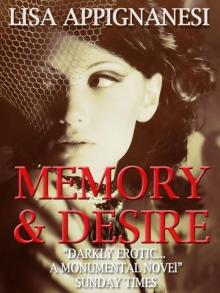 Memory and Desire
Memory and Desire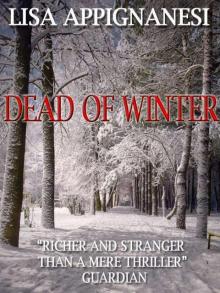 The Dead of Winter
The Dead of Winter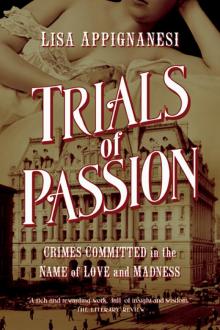 Trials of Passion
Trials of Passion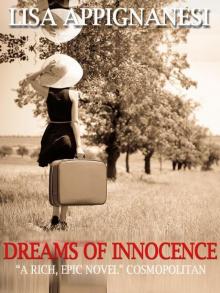 Dreams of Innocence
Dreams of Innocence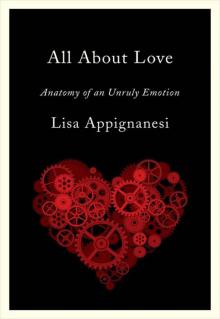 All About Love: Anatomy of an Unruly Emotion
All About Love: Anatomy of an Unruly Emotion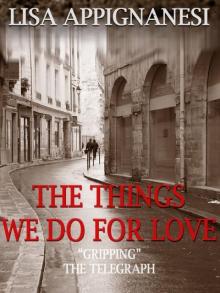 The Things We Do For Love
The Things We Do For Love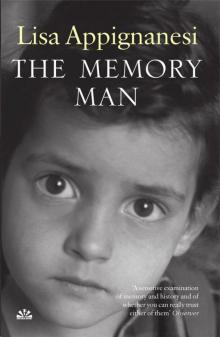 The Memory Man
The Memory Man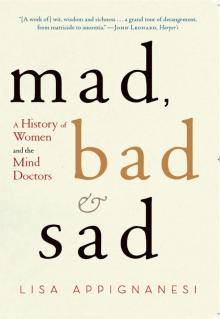 Mad, Bad, and Sad: A History of Women and the Mind Doctors
Mad, Bad, and Sad: A History of Women and the Mind Doctors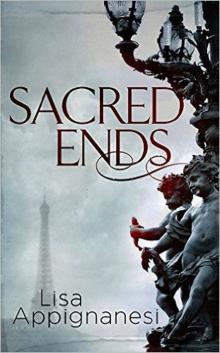 Sacred Ends
Sacred Ends Paris Requiem
Paris Requiem Sanctuary
Sanctuary A Good Woman
A Good Woman